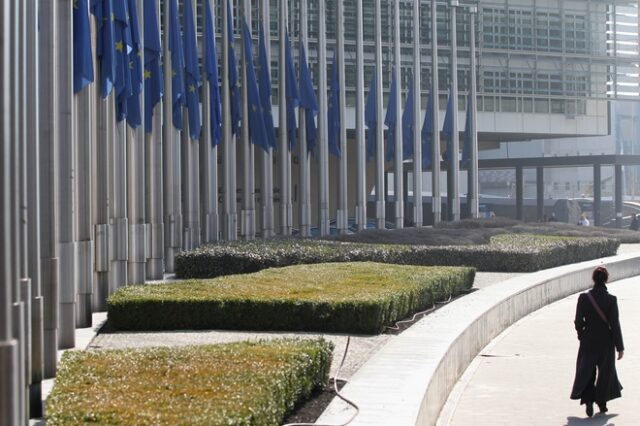Το ειρωνικό δημοσίευμα του Politico για τις “εύκολες” βαθμολογίες των Ελλήνων μαθητών

Τι απαντά το Ευρωπαϊκό Σχολείο Βρυξελλών και ποιο είναι το σύστημα που ακολουθεί διασφαλίζοντας την ποιότητα της διδασκαλίας
- 18 Ιουλίου 2018 18:42
Απάντηση στο εξαιρετικά προσβλητικό δημοσίευμα της ηλεκτρονικής έκδοσης της Politico σχετικά με τις «εύκολες» βαθμολογίες των Ελλήνων μαθητών, εξέδωσε το Ευρωπαϊκό Σχολείο Βρυξελλών. Όπως δημοσιεύει η ιστοσελίδα www.newsville.be, ο γενικός γραμματέας του Ευρωπαϊκού Σχολείου έστειλε απάντηση για το σχετικό άρθρο και τις απόψεις που εκφράζονται σε αυτό.
Το Σχολείο κρατά αποστάσεις από τα δημοσιεύματα και κάνει λόγο για «πολύ γενικές και κοινές δηλώσεις που έγιναν από υπαλλήλους των σχολείων και οι οποίες παρατίθενται (στο άρθρο) εκτός πλαισίου προκειμένου να υποστηριχθεί μια άποψη που η κοινότητα των Ευρωπαϊκών Σχολείων δεν συμμερίζεται».
Αναφέρεται επίσης ότι «το σύστημα που ακολουθεί το σύνολο των Ευρωπαϊκών Σχολείων είναι τέτοιο που διασφαλίζει την ποιότητα της διδασκαλίας, την αξιοπιστία και κυρίως την διαφάνεια των εξετάσεων». Στην επιστολή τονίζεται επίσης πως ενώ στο ρεπορτάζ της δημοσιογράφου υπονοείται πως ο θεσμός των Συντονιστών των Σχολείων ξεκίνησε πρόσφατα, στην ουσία αυτό εφαρμόζεται από καταβολής των Σχολείων.
Στην κατακλείδα της επιστολής, το Ευρωπαϊκό Σχολείο εκφράζει την πεποίθηση πως οι γνώμες που παρουσιάστηκαν στο αρχικό άρθρο αποτελούν μειοψηφία, και πως τα ίδια τα αποτελέσματα των Σχολείων, που κανείς μπορεί ελεύθερα να βρει στο διαδίκτυο, μαρτυρούν το αντίθετο της εντύπωσης που σχηματίζεται.
Διαβάστε ολόκληρη την επιστολή (στα αγγλικά):
European Schools’ statement in response to Ms. King’s article of July 5, 2018.
On July 5, 2018, the European edition of the Politico newspaper published an article entitled «The genius of the Greeks», by journalist Ms. Esther King.
As Secretary-General of the European Schools, and on behalf of the European Schools System, I am keen to distance myself from this publication as, in my opinion, it unjustly discredits our Schools’ reputation.
First of all, I consider it highly regrettable that the professionalism of our Greek teachers and the commitment of their students are disparaged as they are in this article.
It is unfortunate that some very general and commonplace statements made by officials of the Schools are quoted out of context in order to support a view that the European Schools Community in general does not share.
The journalist’s suggestion that the European Schools would tolerate an unfair treatment among the students is misleading. On the contrary, a quality assurance system under the responsibility of national inspectors is in place in all European Schools, to ensure the validity, reliability and transparency of our teaching and assessment. The national inspectors guarantee the level and quality of the Baccalaureate examinations, as well as the respect of the regulations in each examination centre.
Moreover, as the journalist may have known, the European Baccalaureate examinations are governed by the harmonised rules found in our Regulations. Each European Baccalaureate session is overseen and supervised each year by a Chairman of the European Baccalaureate, who is a national independent expert (very often a university professor). The Chairman is proposed by the country holding the annual presidency of the Board of Governors of the European Schools.
While the article claims that subject coordinators are only now being recruited, this system has in fact been in place since the origins of the European Schools, and efforts are constantly made to improve it.
The professional training offered to the teachers in our Schools is updated and reviewed every year. All teachers and other staff members are also reminded annually of the rules of ethics and integrity.
Finally, as Secretary-General, I would like to insist that the opinion expressed in the article is based on very few sources and partly on rumors, and is not confirmed by the long-term data on success rates, which is freely available on the website of the Office of the Secretary-General (www.eursc.eu).







































